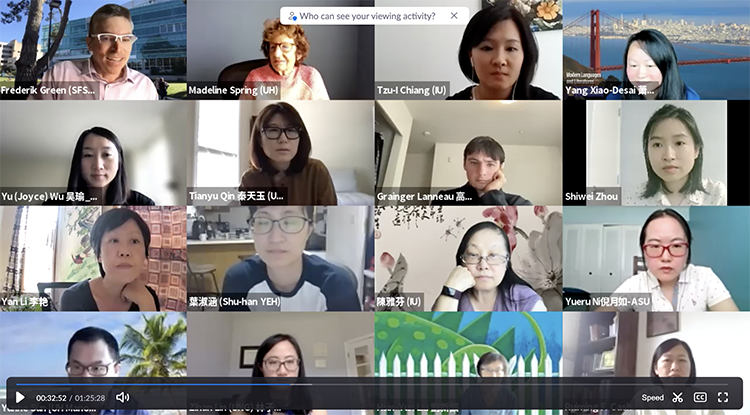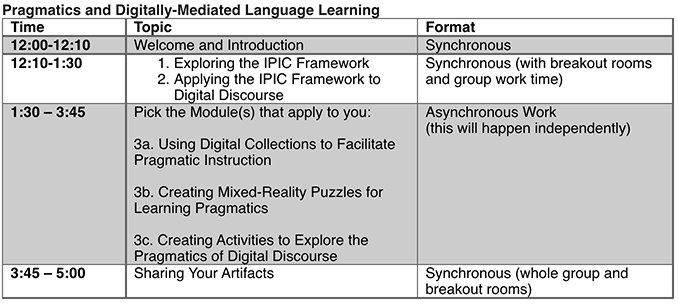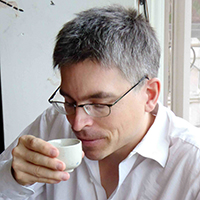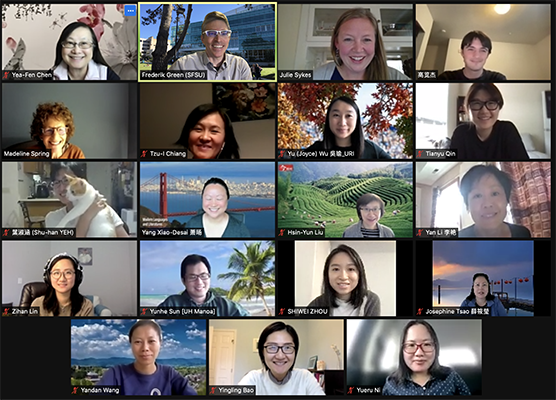Pragmatics in TCSL Workshop (2021)
San Francisco State University's (SFSU) Teacher Training Workshop “Pragmatics in Chinese as a Second Language: Speech Acts and Beyond” was held in October 2021, led by specialists in different areas of Chinese language and linguistics and attended by eighteen language-teaching professionals from a total of 10 different universities.
Funded through the Defense Language & National Security Education Office (DLNSEO), the workshop was conducted over a period of three consecutive weekends in October 2021 (10/16-17;10/23-24; 10/30-31). In order to accommodate participants across various different time zones, the workshop was conducted on all 6 days between 12pm and 5pm PDT. It was led by a team of five professors with different specializations in the field of Chinese language and linguistics and attended by eighteen language-teaching professionals from a total of 10 different universities (University of North Georgia, Indiana University, Kentucky University, University of Minnesota, University of Washington, Arizona State University, the University of Florida, University of Hawaii, University of Rhode Island and SFSU). Participants included Flagship directors and instructors, regular language instructors, and graduate students. Most universities represented in the workshop have an affiliation with the National Language Flagship and most participants have worked in one capacity or another for programs funded by the National Security and Education Program (NSEP). In addition, parts of the workshop were attended by a total of 20 students of varying language proficiencies, representing a total of 4 Chinese Flagship Programs (Indiana University, Arizona State University, University of North Georgia, and SFSU).

Workshop Content

On September 11, 2021, Co-PIs Drs. Xiao-Desai and Green conducted a pre-workshop orientation via Zoom that was attended by all participants. During the orientation, Xiao-Desai and Green first introduced all five presenters (Drs. Li, Sykes, Li, Xiao-Desai and Green) and then provided a detailed overview of the workshop themes and topics that had been developed in tandem with the three other presenters. This was followed by a meet-and-greet during which all participants had an opportunity to introduce themselves to the group and meet all other workshop participants. Finally, participants had an opportunity to suggest any themes and topics they personally had hoped would be covered by the workshop. Following the workshop, an email roster containing email contacts and names of all participants were shared among all participants and a number of suggested readings were distributed electronically among participants.

Shuai Li, Georgia State University
DAY 1: Pragmatic Assessment in L2 Chinese
Day 1 (10/16) and Day 2 (10/17) were led by Dr. Shuai Li and themed “Pragmatics Assessment in L2 Chinese” and “Pragmatics Instruction in L2 Chinese” respectively. On day 1, Dr. Li lectured and led activities that all revolved around the question of “what to assess” and “how to assess.” The day started with a presentation and discussion about the nature of pragmatics in general and in the Chinese language classroom in particular. It was followed by discussions of pragmatics and its subfields, theorizations of (L2), and small groups discussion and concluded with a sharing exercise. Li then proceeded by leading discussions and conducting exercises related to construct-centered approaches (top-down) and task-centered approaches (bottom up), assessment instruments and modes of communications. The first day concluded with group discussions and group exercises that all addressed the question of how to evaluate pragmatic performance. Li introduced linguistic analysis approaches and rating scales based on rating criteria and invited participants to experiment with these and share experiences.
-
12:00 – 12:50pm: Pragmatics and L2 pragmatic competence
- Nature of pragmatics
- Pragmatics and subfields
- Theorizations of (L2) pragmatic competence
- Small groups discussion & sharing
-
01:00 – 02:50pm: What to assess?
- A construct-centered approach top-down)
- A task-centered approach (bottom up)
- Assessment instruments & modes of communication
- Individual activities, discussion & sharing
-
03:00 – 05:00pm: How to evaluate pragmatic performance?
- Linguistic analysis approach
- Rating scales based on rating criteria
- Individual activities & sharing

Shuai Li, Georgia State University
DAY 2: Pragmatic Instruction in L2 Chinese
On Day 2 (10/17), Li shifted the attention from questions of assessment to didacticism and began by asking why teaching pragmatics should be part of Chinese language curricula, and how best to teach it? Topics discussed included sources of learners’ divergent pragmatic performance and instructors’ knowledge base for teaching pragmatics as well pragmatic features that can be found in Chinese-language textbooks commonly used across US educational institutions. Li then introduced and led several hands-on exercises and opportunities for participants to exchange ideas. Li’s workshop module concluded with an overview of theories of teaching pragmatics across learning contexts and more concrete examples of how to use and adapt existing textbook materials to teach pragmatics. The first weekend of the workshop concluded with a group check-in and a very brief overview of the following week-end’s presentations. In addition, we asked participating Flagship instructors and directors to encourage their Flagship students to volunteer for participation in the simulated pragmatic teaching sessions scheduled for the last day of the workshop.
-
12:00 – 01:15pm: Learners and instructors
- Why teaching pragmatics?
- Sources of learners’ divergent pragmatic performance
- Instructor’s knowledge base for teaching pragmatics
- Small group discussion & sharing
-
01:30 – 03:00pm: What to teach?
- Pragmatic features to teach
- Representation of pragmatics information in language textbooks
- Individual Activity & group sharing
-
03:15 – 05:00pm: How to teach?
- The Noticing Hypothesis
- Teaching pragmatics across learning contexts
- Using & adapting existing textbook materials to teach pragmatics.
- Individual activity & sharing/general discussion

Yang Xiao-Desai, San Francisco State University
DAY 3: Practical Ways to Teach Pragmatics in CFL Classrooms: Speech Acts & Beyond
Dr. Xiao-Desai took the lead on Day 3 (10/23) which was themed “Practical ways to teach pragmatics in CFL classrooms: Speech acts and beyond.” The module picked up where Dr. Li had left off the previous weekend by elaborating on the question of why pragmatics should be central to Chinese language classrooms and how the lack of suitable curricular materials can best be addressed. Xiao-Desai then proceeded to illustrate how different speech acts and formulaic language (such as requests, apologies, invitation sequences, compliments etc.) all constitute pragmatic tasks that can be found in existing teaching materials, even though they are typically not perceived or emphasized as such. Xiao-Desai’s presentation was followed by an exercise and group activity that encouraged participants to locate pragmatic speech acts in existing learning materials and to then design a pragmatics-focused teaching session for a micro-demonstration. By way of adopting a methodological perspective of instructional pragmatics, Xiao-Desai illustrated how pragmatics-focused teaching and materials development in CFL curricular design can successfully go hand in hand and how challenges to teaching pragmatics in CFL classrooms can be overcome. Her module concluded with a discussion of principles and best-practices for pragmatics-focused curriculum design for different proficiency levels, from first-year to fourth-year Chinese.
Synchronous session:
- 12:00 - 01:10: Resources for pragmatics-focused teaching and materials development in CFL curricular
- 01:30 - 03:30: Examples of pragmatics-focused instruction
Asynchronous session:
- From 03:30 to 11:00pm, October 30: Design a pragmatics-focused teaching session for micro-demonstration on Oct. 31st.

Julie Sykes, University of Oregon
DAY 4: Developing Pragmatic Competence in Digital Times
Day 4 (10/24) of the workshop was led by Dr. Sykes. Entitled “Developing Pragmatic Competence in Digital Times,” Sykes’s module focused on theoretical and practical approaches to gaining and teaching intercultural, pragmatic, and interactional competence. Sykes module was divided into a synchronous and asynchronous component. In the first synchronous part, Sykes introduced a wide variety of technologies for teaching and learning intercultural competence and interlanguage pragmatics and discussed their applicability to different instructional modes and learning outcomes. In the second asynchronous part, Sykes invited participants to pick one or more technologies suitable for pragmatic instruction from the Pragmatics and the Digital World google classroom curated by the Center for Applied Second Language Studies at the University of Oregon and to choose between one of three tasks: use the technology tool to facility pragmatic instruction in your classroom; create a mixed-reality puzzle for learning pragmatics; or crate activities to explore the pragmatic of digital discourse. This was then followed by a share and discuss activity. All of the resources introduced by Xiao-Desai and Sykes were again archived on the iLearn site. Like the first workshop weekend, the second weekend concluded with a debrief and a quick preview of the following week. This included a quick overview of the asynchronous modules assigned for the second-to-last day of the workshop and that participants were free to complete during any time of the week as well as a pitch for volunteers to design simulated pragmatics teaching sessions on the last day of the workshop.

Additional Resources
Optional Readings

Frederik Green, San Francisco State University
DAY 5: Integrating Pragmatics Teaching & Learning into Content-based Instruction
PART I: Teaching Literature and Chinese Pragmatics
The last weekend (10/30) of the workshop was designed to introduce participants to concrete examples of pragmatics infused teaching and learning within the Flagship curriculum at SFSU, to provide tools that participants could emulate or expand on in their own teaching, and to allow participants to integrate some of the skills and techniques acquired during the workshop into a short teaching demo to be performed (and peer-reviewed) on the last day of the workshop. Entitled “Integrating Pragmatics Teaching & Learning into Content-based Instruction,” day 5 was equally divided between modules designed by Drs. Green and Li. Green’s module, an entire one-week modern literature module for an advanced literature and culture Flagship content course, was designed as an asynchronous module and participants had all week to complete the module, but they could also do so during the designated 2.5hrs time slot on Saturday, October 30. The module started with a pre-recorded introductory clip in which Green sketched out the design of his course entitled "尋找上海:二十世紀都市文學與文化 (Searching for Shanghai: 20th C Urban Literature & Culture) and explained the degree to which pragmatics had informed course design and instructional goals. The introductory lecture also included an overview of useful instructional tools, all of which were linked on the iLearn page. The introductory clip was followed by a full sample module consisting of a course lecture, quizzes, written and spoken assignments, and translation exercises. Participants were encouraged to complete the sample exercises and asked to leave feedback and questions in an online forum. The module concluded with a synchronous discussion session at the end of the designated time slot in which Green responded to forum comments and moderated a discussion on the integration of pragmatics in Flagship content courses.
INTRODUCTION: 尋找上海:二十世紀都市文學與文化
TOOLBOX: 尋找上海:二十世紀都市文學與文化
Additional Resources for 張愛玲

Chris Wen-chao Li, San Francisco State University
DAY 5: Integrating Pragmatics Teaching & Learning into Content-based Instruction
PART II: Teaching Media Writing
The second module, an advanced class in Chinese journalism designed by Dr. Li, consisted both of synchronous and asynchronous components. The class, which draws on Li’s experience as a Chinese-language journalist for the BBC World Service, teaches skills necessary to successfully work in the field of Chinese-speaking media to advanced students. As such, it focuses both on writing and speaking, and consciously incorporates pragmatics speech acts in the various class modules (including writing the lead, coverage angles, broadcast production, and packaging world news). Li had prerecorded a number of short clips that all represented compressed micro-modules that mirrored topics from his class and that participants were asked to watch. Participants then contributed to an online forum that was monitored by Li before joining a synchronous discussion session after each micro-module.
Both Li’s and Green’s modules illustrated how pragmatics topics and activities can be integrated into the advanced Flagship curriculum and even be aligned to Flagship tutoring programs. Day 5 (10/30) concluded with a preview of the final day and a reminder email to student volunteers to be ready for the teaching sessions they had volunteered for the following day.

DAY 6: Simulated Pragmatics Teaching Sessions
Day 6 (10/31) presented the culmination of the workshop. Four participants had volunteered to lead simulated pragmatics teaching sessions that had been group-designed and that addressed students at three distinct proficiency levels: Novice high, intermediate mid, and advanced low. Students had been assigned to a time slot corresponding to their respective proficiency level and gathered in a Zoom waiting room before being invited into a separate room where Co-PI Green prepped them about their respective teaching session. In the meantime, Co-Pi Xiao-Desai prepped participants who were not leading a session to observe and critically comment on the session by filling out a peer-review rubric that was informed by a worksheet for pragmatics-focused Instruction developed by Xiao-Desai and introduced to participants during day 3 of the workshop. Each of the simulated sessions were followed by break-out discussions in which impressions of the class and suggestions for improvements were discussed. The last day of the workshop concluded with a debrief in which participants were invited to reflect on what had been learned over the past three weekends and how the topics covered in the workshop would impact their future teaching. It also asked participants to fill out an exit survey that would be sent to everyone in the following days. The workshop ended with a group photo and a commitment to make pragmatics more central to Chinese language teaching across all levels and across the curriculum.